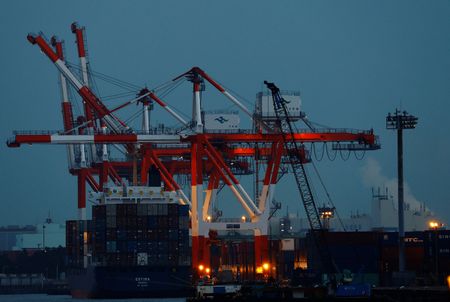By Tetsushi Kajimoto and Kantaro Komiya
TOKYO (Reuters) – Japan’s economy unexpectedly shrank for the first time in a year in the third quarter, stoking further uncertainty about the outlook as global recession risks, a weak yen and higher import costs took a toll on household consumption and businesses.
The world’s third-biggest economy has struggled to motor on despite the recent lifting of COVID curbs, and has faced intensifying pressure from red-hot global inflation, sweeping interest rate increases worldwide and the Ukraine war.
Gross domestic product fell an annualised 1.2% in July-September, official data showed, compared with economists’ median estimate for a 1.1% expansion and a revised 4.6% rise in the second quarter.
It translated into a quarterly decline of 0.3%, versus a forecast of 0.3% growth.
GRAPHIC: Unexpected contraction (https://graphics.reuters.com/JAPAN-ECONOMY/GDP/dwpkdrrervm/chart.png)
On top of being squeezed by a global slowdown and soaring inflation, Japan has been dealing with the challenge of the yen’s slide to 32-year lows against the dollar, which has magnified cost-of-living strains by further lifting the price of everything from fuel to food items.
“The contraction was a surprise,” said Takeshi Minami, chief economist at Norinchukin Research Institute.
The lifting of COVID restrictions offered some relief, Minami said, but “the outlook was clouded by uncertainty” over fresh virus cases.
“While the rise of inbound tourists is a bright spot for October-December and beyond, we see downside risks from the rising price of goods and the fear of another outbreak,” he said.”
GLOBAL RISKS
The risks to Japan’s outlook have risen as the global economy teeters on the brink of recession.
Economy Minister Shigeyuki Goto said a global recession could hit households and businesses.
At home, policymakers and citizens are bracing for a potential eighth wave of the COVID pandemic, adding to the gloom for private consumption which makes up more than half of the Japanese economy.
In the third quarter, private consumption grew 0.3%, a touch above consensus estimate for 0.2% growth but slowing sharply from the second quarter’s 1.2% gain.
The data suggested consumer spending will remain pressured over the coming months, with real compensation of employees falling 1.6% in the third quarter, posting a second straight quarter of declines and extending from previous quarter’s 1.2% decline.
“Growth should turn positive in Q4, amid a rebound in inbound tourism and a smaller trade deficit, but the eighth virus wave and rising inflation will limit the recovery,” said Darren Tay, Japan Economist at Capital Economics.
Tay noted that non-residential investment increased by 1.5% quarter-on-quarter, below consensus of a 2.1% rise and Capital Economics’ own estimate for a strong 3.0% growth rate.
Exports grew by 1.9% but were overwhelmed by hefty gains in imports, meaning external demand subtracted 0.7 percentage points from GDP.
Prime Minister Fumio Kishida’s government is stepping up support for households to try to ease the effects of cost-push inflation, with 29 trillion yen ($206.45 billion) in extra spending in the budget. The Bank of Japan has also maintained its ultra-loose monetary stimulus programme to help revive the economy.
Capital Economics’ Tay sees a tough 2023 for Japan.
“As for 2023, Japan will be dragged into a mild recession in H1 by a global downturn that will weigh on exports and business investment.”
($1 = 140.4700 yen)
(Reporting by Tetsushi Kajimoto; Editing by Chang-Ran Kim & Shri Navaratnam)



